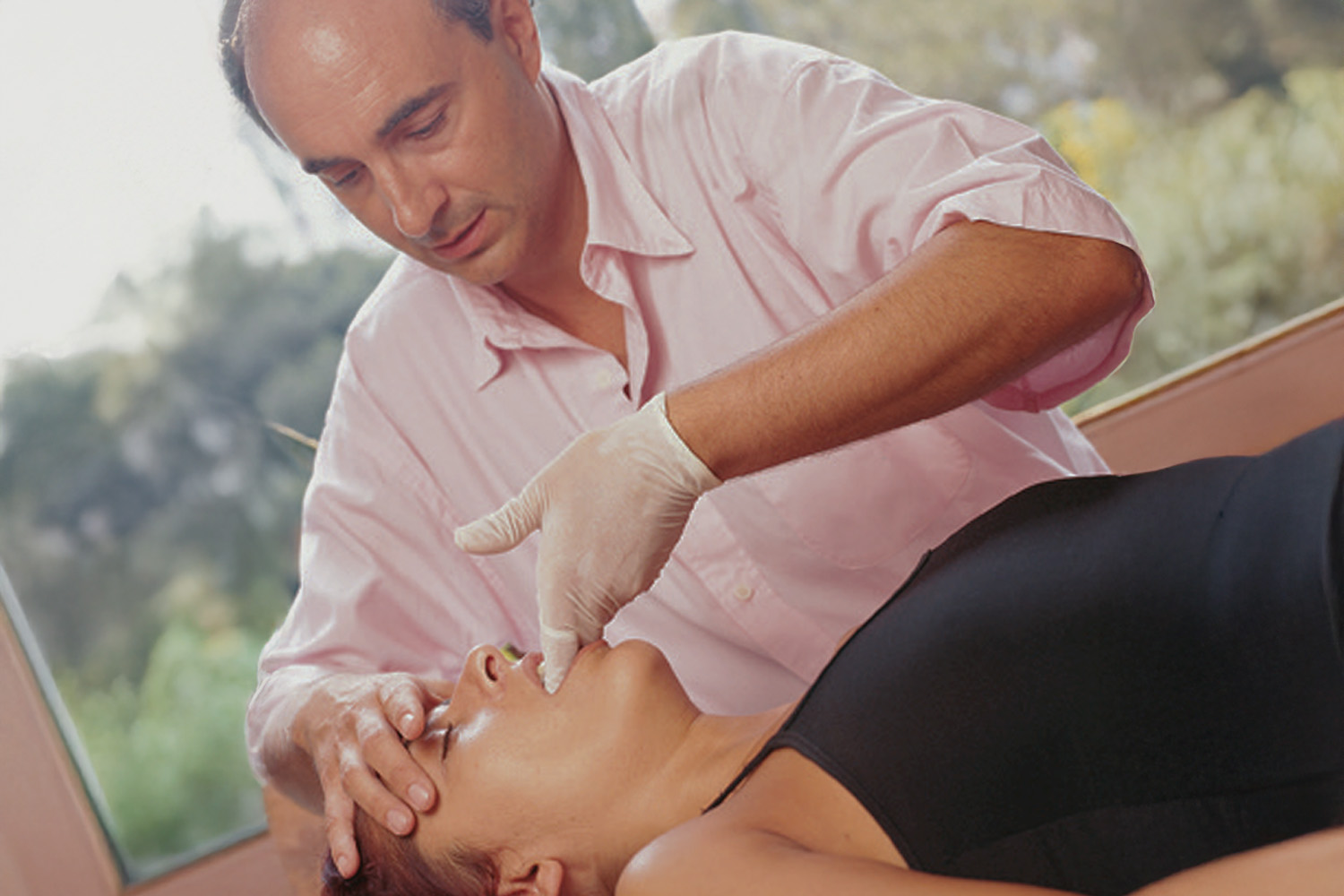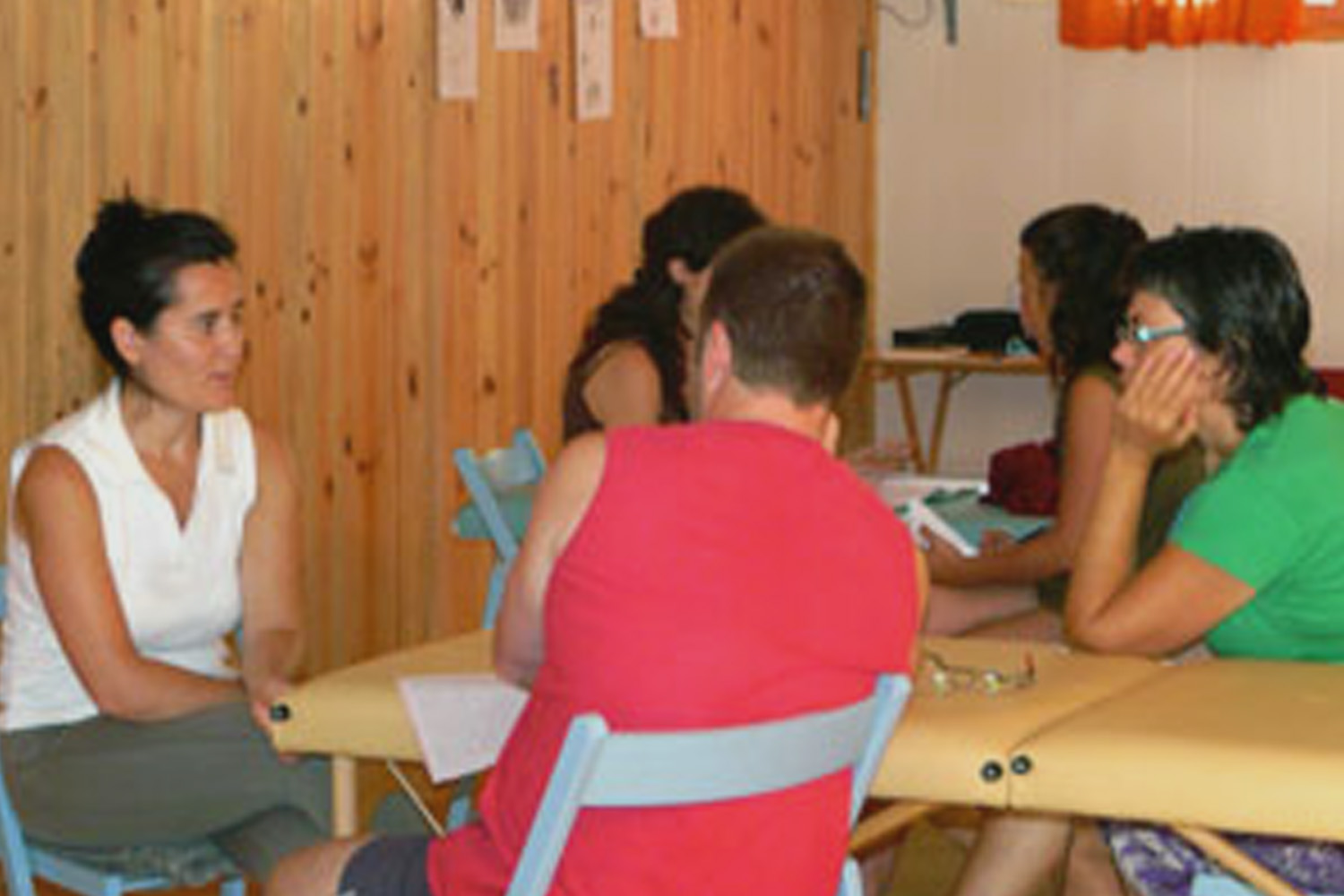Training 2025
Advanced Craniosacral Training 1
Advanced Craniosacral Training – 1
Reus – 4 weekends
This is an advanced Craniosacral training divided into 4 weekend seminars, which will begin on the weekend of February 24, 2024 and will end on the weekend of May 4, 2024. Between seminars, it is recommended to practice what you have learned. At the end of each weekend, a manual notebook with the material given in the seminar will be delivered (total 4 notebooks) and at the end of the 4th seminar, a certificate / diploma of participation will be awarded. We will also give exams during the course, multiple choice tests to do at home. Separate weekends cannot be held.
This is an advanced Craniosacral Therapy training in which you will learn in-depth work on the jaw, eyes, and face with specific protocols, combined with a full craniosacral session. It covers the scientific aspect, the anatomy and physiology of the craniosacral system, visualization exercises to feel the anatomy in an experiential way, demonstrations of different techniques by the teachers, as well as the gradual accumulation of experiential and practical experiences with the exchange of sessions between the participants. Places are limited to 10 participants (with one stretcher for every two people), favoring a deep and dynamic learning, thus ensuring a closer monitoring of each participant and a stress-free environment.
For students who want to continue the training, we organize the training of Advanced Craniosacral-2 in 2024 (Somato Release Emotional).

Practice is fundamental to our teaching method. If your professional activity is related to health, it is an opportunity to deepen your capabilities and learn to work on your body, mind and emotions, experiencing working with yourself and others.
Dates of the 4 seminars:
September 20 and 21, 2025
October 18 and 19, 2025
November 15 and 16, 2025
December 13 and 14, 2025
none
Program
The program is for guidance only and concise.
ADVANCED CRANIOSACRAL – 1
- Relationship of the jaw with emotional state.
- The temporomandibular joint (TMJ) in depth: anatomy and physiology.
- 5-phase TMJ release protocol: “thumbs on the jaw.”
- Untwisting technique.
- Complete basic TMJ protocol session.
- Sphenoid bone in depth: anatomy and physiology.
- MRP of the sphenoid: theory and practice.
- Relationship of the sphenoid with the nerves. cranial.
- Relationship of the sphenoid with vision and hormonal function.
- Palpatory testing and restriction patterns of the sphenobasilar joint (1).
- Normalization techniques. Flexion and extension.
- Life as movement and the state of balance.
- Resources as healing fulcrums. Resolving inertial patterns by releasing power. Learn the art of indirect and direct technique.
- Palpatory test and restriction patterns of the sphenobasilar joint (2).
- Normalization technique: right torsion and left torsion.
- Palpatory test and restriction patterns of the sphenobasilar joint (3).
- Normalization technique: right convexity lateroflexion and left convexity lateroflexion.
- Palpatory test and restriction patterns of the sphenobasilar joint (4).
- Normalization technique: right lateral strain and left lateral strain.
- Palpatory test and restriction patterns of the sphenobasilar joint (5).
- Normalization technique: superior vertical strain and Lower vertical strain.
- Palpatory test and restriction patterns of the sphenobasilar joint (6).
- Normalization technique: sphenobasilar compression.
- We will do visualization exercises to experience the anatomy for ourselves.
- Practice the principles in individual sessions.
- Maxillae, palatines, vomer in depth: anatomy and physiology.
- Mouth work. Hard palate. Median palatine and transverse palatine sutures.
- Relationship: dentistry and craniosacral. Impact of dental work.
- Paranasal sinuses.
- Muscles related to the hard palate.
- Maxillary bone in depth: MRP and sphenomaxillary normalization techniques.
- Sphenomaxillary normalization technique: Flexion and extension.
- Sphenomaxillary normalization technique: Sphenomaxillary torsion: right or left.
- Sphenomaxillary normalization technique: Sphenomaxillary lateral displacement: right or left.
- Sphenomaxillary normalization technique: Sphenomaxillary compression.
- Vomer bone in depth: anatomy, physiology, and MRP.
- Palpatory testing, injury patterns, and normalization technique.
- Palatine bone in-depth: anatomy and physiology and MRP.
- Normalization techniques.
- Basic hard palate protocol: maxillae, vomer, palatines.
- Cranial work with the ocular structure.
- Anatomy and physiology in relation to the CS system.
- Orbital cavities: bone component, relationship with nerves and vessels.
- Orbital cavities: muscular relationship.
- Technique for directing energy to the eye sockets.
- Technique for widening the orbits in three Phases.
- Release of the frontonasal suture.
- Tapping technique.
- Unscrewing the eyeball.
- Basic protocol for working with the eyes.
- The unity and totality of the body.
- We will do visualization exercises to experience the anatomy within ourselves.
- Practice the principles in individual sessions.
Place
Mandala Psychology Center
C/ Jurats 2, 4º, door A,
43205, Reus
- 10-minute walk from Reus train station
- 3 minutes from La Pastoreta car park (4 euros for all-day parking)
- 1 hour from Barcelona by car
For those who need to stay overnight in Reus, there are many options, with different prices.
Schedules
The first seminar will begin on Saturday, September 20th, from 10:00 a.m. to 7:00 p.m., and on Sunday, September 21st, from 9:30 a.m. to 2:00 p.m.
The workshop also serves to develop your own energy and share creatively with others through therapeutic touch.
At the end of each seminar, a workbook will be provided with the seminar materials. At the end of all four seminars, a certificate of participation will be awarded.
Information
What you need
Comfortable clothing (socks and sneakers), a notebook for taking notes, and a sarong or shawl.
Limited places
Places are limited to 10 participants (with one table for every two people), promoting in-depth and dynamic learning, ensuring closer monitoring of each participant and a stress-free environment. Reserve your place in advance, as the course has limited capacity.
Attendance
Attendance at all seminars is important. In exceptional circumstances, if it is impossible to attend a seminar, the possibility of making up the session in a private class (morning or afternoon) after the scheduled time, as agreed between the teacher and the student, may be considered. In all cases, the full fee for the seminar must be paid.
Price
4 seminars at €240 each (total: €960) and registration fee of €100
To reserve your place it is essential to make a transfer of €100 to the La Caixa account:
2100- 0166- 01- 010123—
(Please notify us in advance by phone and include your name in the subject of the transfer).
The €240 fee for each course must be paid at the center on the Saturday before each weekend begins.
The course will not start if there is not a minimum number of participants, and the start date may be delayed.
Refund Policy
The organization is not responsible for cancellations made by third parties. The course has a minimum of 8 places. If the minimum number is not met, the start of the course will be postponed. This is the only case in which the registration fee will be refunded if the participant does not wish to wait for the new date. Once the training has begun, no amounts paid will be refunded.

Basic Craniosacral Training 2025
Reus: 4 weekly caps
It is a basic Craniosacral training divided into 4 weekly chapter seminars, we will begin the weekly chapter on September 20, 2025 and finish the weekly chapter on September 13, 2025.

Advanced Craniosacral Training - 1
Reus: in 4 weekend caps
It is an advanced Craniosacral training divided into 4 weekly chapter seminars, which will begin on February 21, 2025 and end on May 2, 2025.

Advanced Craniosacral Course- 2
Emotional Alliberation Panizo Method
This course is directed for therapists oriented to what has been done at the basic level of Craniosacral Therapy in both nostrils and also for other craniosacral therapists in other schools with experiences that involve working on the emotional part of their clients or that are affected by trauma. The six sessions seek perspectives, safe and practical practices for the benefit of the six needs.
